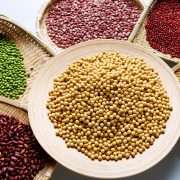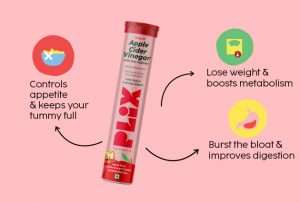What are Probiotics? Pre and Probiotic capsules dosage, their uses, benefits & dosage

Probiotics are good bacteria or beneficial bacteria and beneficial yeast that naturally exists in your body. Bacterias are commonly thought of as something that makes you sick. However, your body is constantly infected with two types of bacteria: good bacteria and bad bacteria. Probiotics are good bacteria that help keeps your Happy Tummy, body healthy and functioning properly. These good bacteria benefit you in a variety of ways, including fighting off bad bacteria when you have an abundance of them and making you feel better. Microbes are members of this community. These microbes are a mix of Bacteria, Fungi (including yeasts), viruses, and Protozoa. Everyone’s microbiome is distinct.
Related Product: Happy Tummy
Prebiotics & Synbiotics
Prebiotics, which are carbs — often dietary fibers — that help feed the friendly bacteria that are already in your gut, should not be confused with probiotics. Synbiotics are products consisting of prebiotics and probiotics. Synbiotic products typically combine friendly bacteria with food for the bacteria to eat (prebiotics) in a single supplement.
Natural probiotics can be found in a variety of slightly fermented foods; kimchi, and yogurt are a few examples. Probiotics are available for consumption as a food-grade health supplement. Probiotics are typically kept in the refrigerator to keep the bacteria in them alive and ready to reproduce. Probiotics can be obtained through supplements as well as foods prepared through bacterial fermentation.
Where are beneficial bacteria found in our body?
Though your gut is the most commonly linked location for beneficial microbes, there are several locations in and on your body that host good microbes. These points of contact with the outside world include your: gut, mouth, lungs, urinary tract, and skin.
How do probiotics function?
When you are sick, bad bacteria enter your body and multiply. Good bacteria fight them and restore the balance in your body.
Certain types of good bacteria can improve the digestion of food, prevent bad bacteria from multiplying and produce vitamins.
Good bacteria are a natural component of your body. Eating a well-balanced, fiber-rich diet daily helps to maintain optimum levels of good bacteria.
Which are some commonly known probiotics?
When people talk about probiotic bacteria, they usually mean one or two types of bacteria. Though many different types of bacteria can be considered probiotics, two types of bacteria are commonly found in stores which are Lactobacillus and Bifidobacterium strains. Saccharomyces boulardii is the most commonly known yeast probiotic.
Related Article : Top 10 Probiotics for Adults and What to Consider When Choosing One
Benefits of Probiotics
The gastrointestinal system is extremely complex, and there is compelling evidence that the microbial composition of the gut plays a critical role in maintaining human health. An unhealthy gut microbiome with too many bad bacteria is known to affect nutrient absorption, blood sugar regulation, and nerve function and can even put us at risk of obesity and other diseases. This has been linked to the development of inflammatory bowel disease, cancer, sleep issues, and even a weakened immune system. Gut bacteria produce hormones that regulate sleep and mental states, putting those with poor gut health at a higher risk of insomnia and depression.
Related Article: 7 Benefits of Probiotics for your body
Probiotics tablet uses
A healthy, balanced gut microbiome with an abundance of ‘good’ bacteria improves immune system function, improves sleep, can prevent depression, and lowers the risk of obesity. Consuming these good bacteria, the most well-studied probiotic strains being Lactobacillus and Bifidobacterium, encourages their colonization in our gut. They aid in the control of harmful bacteria, the protection of the intestine lining, and the breakdown of food. Consuming these beneficial bacteria can be accomplished through natural sources such as fermented foods or through dietary supplements containing these bacteria, products that are frequently marketed as probiotics. These are commonly sold commercially as daily probiotics capsules or probiotics tablets, but they can also be added to foods such as yogurt.
Probiotics for heart health:
Cholesterol: Some probiotic strains simply absorb cholesterol from their environment. Others have a sticky surface to which cholesterol adheres so that it is not absorbed into the gut. Probiotics also produce bile, which can lower your body’s circulating cholesterol levels.
Blood Pressure: Studies show that certain probiotics can significantly lower blood pressure, especially in people who already have high blood pressure. This is significant because high blood pressure is a major risk factor for heart disease.
Inflammation: Chronic inflammation of the blood vessel wall can contribute to heart disease. Taking probiotics can help restore balance to your gut microbiome, reducing the production of pro-inflammatory chemical messengers in your body.
Difference between Probiotics and Prebiotics
Probiotics are bacteria that naturally exist in your body and aid in the digestion of food. Prebiotics exist to provide food for the probiotic bacteria that you are ingesting. Prebiotics are not required for probiotics to work, but taking them may increase the effectiveness of your probiotics.
Pre & Probiotic capsules uses
Prebiotics do not contain bacteria. They serve as food for bacteria. Prebiotics are also available as a commercial food additive or as a capsule supplement. Prebiotics are not particularly beneficial on their own. Probiotics and prebiotics appear to have an effect only when used together.
How prebiotics help
The bacteria in your gastrointestinal tract never waste food. These beneficial microorganisms break down and digest your food to boost your immune system and reduce inflammation. Prebiotics are responsible for keeping them active! Microorganisms must survive stomach acid and bile and make it all the way to your colon to meet up with the other live microorganisms that live there. They must be able to survive in that environment once they arrive. The more diverse these beneficial microorganisms are, the more they can do for you. Prebiotics serves as a food source for the microorganisms in your gut, and they must pass through digestion to reach your colon. To survive, the microorganisms metabolize and ferment the prebiotics.
Prebiotic Benefits:
Prebiotics has numerous advantages, such as the regulation of bowel movements, appetite suppression, absorption of nutrients, improvement of bone density, improvement of immunity and the anti-inflammatory response of the body, and stimulating the production of good bacteria. Although there are many different types of prebiotics, resistant starches, inulin, and pectin are three of the most common.
1. Resistant starches
These, like fiber, resist digestion and become a primary food source for microorganisms in your colon. Resistant starches can be found in boiled and chilled potatoes, green bananas, barley, oats, rice, beans, and legumes.
2. Inulin
Inulin is a prebiotic fiber found in a variety of plants. This prebiotic can help you feel fuller for longer periods, which can help with overeating and bowel movements. It can also help lower LDL cholesterol (bad cholesterol), stabilize blood sugars, and increase good bacteria in your gut. Inulin can be taken as a supplement in the form of gummies, tablets, capsules, and powder. Foods high in inulin are chicory root, garlic, onions, and soybeans.
3. Pectin
Pectin can be found in a variety of fruits, particularly raw apple pulp. Pectin is a type of gel-like starch that is commonly used in the production of jams and jellies. This starch has antitumor and antioxidant properties. It may also improve the skin cells of your gut lining, reduce the ability of bacterial diseases to take root, and increase the diversity of microorganisms in your gut. Pectin-rich foods include apples, peaches, raspberries, carrots, tomatoes, and apricots.
Pre and Probiotic capsules dosage
Probiotics dosage for adults:
An adequate dosage is important for anything you consume to improve your health. If you take too much, new problems may be caused, and taking too little will have no effect. While there are recommended probiotic capsules dosages for adults with various ailments, it is best to consult with a doctor about the best dosage for you. Only a physician who has examined you will be able to determine your specific health needs or dosage amounts.
Prebiotic dosage for adults:
For adults, the recommended fiber intake ranges from 25 to 38 grams per day. Many prebiotic supplements provide a dose of 4-5 grams per day. If you take a prebiotic supplement, start slowly (once a day) until you see how your body reacts to it. If you experience gas or bloating, cut your dose in half. Many people combine prebiotics and probiotics to gain an advantage. Prebiotics are sometimes added to probiotics to maintain their levels in the intestine because probiotics are short-lived. This probiotic/prebiotic combination is known as “synbiotic therapy” or “synbiotics.”
This way you can aim for an ideal prebiotic and probiotic capsules dosage.
How to choose the right probiotic for adults:
Probiotics are safe for most people, according to experts. If you do experience side effects, they are usually minor, such as having a little more gas than usual. However, exercise caution if you have a serious health condition or a weakened immune system It’s best to check with your doctor first to see if they’re safe in those cases. Also, before giving probiotics to your infant, consult with your doctor, especially if they are sick.
Go for quality:
Probiotics are marketed under supplements. The FDA does not inspect them for safety or health claims made by the manufacturer, as it does with drugs. This emphasizes the importance of selecting a reputable brand. You can consult your doctor for recommendations. You can also conduct your research to determine which brands receive high marks. While you’re at it, look for studies that back up any claims made by the probiotic’s manufacturer.
Consider the CFU (Colony Forming Unit)
This indicates the number of bacteria in each dose. The amount required varies depending on the type and what you want to treat. The majority of doses range from 1 to 10 billion CFUs and are taken once or twice a day. If you do not consume enough CFUs, you may not achieve the desired results. However, more isn’t always better. It could be a complete waste of money. Consult your doctor to determine what you may require. However, the CFU count is important because it tells you how much you’re getting when you use the probiotic before it expires. examine the Label; it will inform you of the strains and CFU, but that isn’t all you need to know.
Pre and Probiotic capsules dosage:
Dosage lets you know how much you need to consume to obtain results. Check that the CFU count in each dose corresponds to what the research says you require.
How to store it
Some probiotics must be kept in the refrigerator. Make sure the store you’re buying it from stores it correctly. Do the same thing when you get home. Heat-dried formulas should be kept in the refrigerator, whereas freeze-dried formulas can be stored at room temperature.
Other ingredients:
Check that everything in the probiotic is safe and that you aren’t allergic to anything, such as soy or dairy.
Plix Life is a Mumbai-based company that has mastered the art of delivering good health in the most palatable way. Happy Tummy – Pre+Probiotics and Probiotic+ Apple Cider Vinegar are products from Plix that can help you get better at your gut game!
FAQs
1. Can I increase the number of beneficial bacteria in my body?
Yes! It is possible to do so through foods, drinks, and supplements. Fermented foods, in particular (yogurt and pickles), are home to a plethora of beneficial bacteria. Fermented drinks such as kombucha and kefir can also add probiotics to your diet.
Probiotics can be added to your diet through dietary supplements, in addition to food. Because these are not drugs, they do not need to be approved by the FDA (FDA). Before beginning any supplement or making major dietary changes, always consult with your healthcare provider.
2. How should I consume a probiotic supplement?
You can consume probiotics in several ways. They are found in a variety of forms, including foods, drinks, pills or capsules, powders, and liquids.
3. Are probiotics safe to be consumed?
Probiotic foods and supplements are generally considered safe because the microbes used as probiotics already exist naturally in your body. They may cause allergic reactions, as well as mild stomach upset, diarrhea, flatulence, and bloating in the first few days of use.
Certain people should exercise caution when taking probiotic supplements.
4. Are there risks associated with probiotics?
Probiotics are generally thought to be safe. There are, however, some risks associated with the supplements. Risks that are unlikely but possible include infection and antibiotic resistance.
5. Can my kids consume probiotics?
Probiotics can benefit both adults and children. If your child has an illness that requires antibiotic treatment, taking a probiotic can help shorten the duration of the illness. Probiotics can also help children with constipation, acid reflux, diarrhea, gas, and eczema.
6. Should I take probiotics after antibiotics?
Antibiotics are frequently required to combat an infection. However, while antibiotics kill the bad bacteria in your body, they also kill the good bacteria. After taking an antibiotic, some people experience side effects such as diarrhea. Some studies have found a link between taking probiotics after an antibiotic and relief from diarrhea. This has yet to be proven and does not work for everyone.
7. How are probiotics different from prebiotics?
Probiotics improve gut health by promoting the growth of beneficial bacteria. Prebiotics, on the other hand, feed good bacteria. Probiotics and prebiotics have mutual benefits in addition to their applications. Plix Good Gut combines the health benefits of Pre and Probiotics.
8. Why choose Plix Happy Tummy – Pre+Probiotics?
Plix Happy Tummy – Pre+Probiotics contains 100% natural and clinically studied ingredients like Chicory root, Green Apple, and 6 essential probiotic strains. This blend keeps bloating at bay and improves digestion.
9. What Are The Benefits Of Apple Cider Vinegar in Plix Probiotic+ Apple Cider Vinegar?
Apple cider vinegar in this product has numerous health benefits. Some of the benefits of Apple Cider Vinegar (ACV) include healthy weight loss, boost metabolism and also help with appetite control. It also helps to balance blood sugar levels & maintain good heart health.
More Pre and Probiotic -related articles you may like:
1.Advantages of prebiotics and probiotics capsules
2. Pre and Probiotics – The Secret to a Happy and Healthy Gut
3.Top 10 Probiotics for Adults and What to Consider When Choosing One














